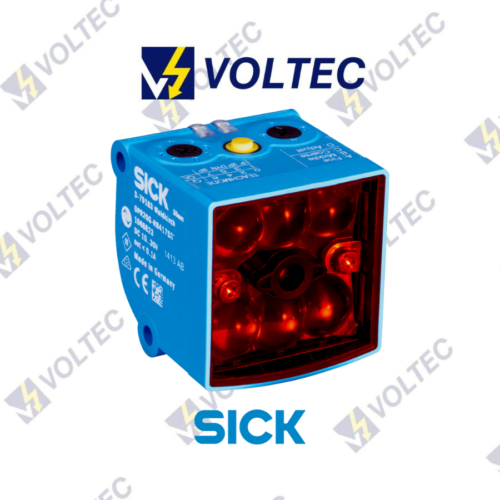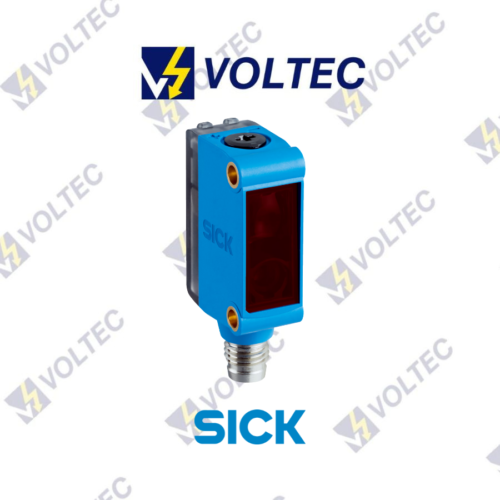Need help? Call us: 01326 708334, 01326 708335 or info@voltecbd.com
- Sensor principle: Delta‑S‑Technology®
- Switching output: Push‑pull: PNP/NPN
- Switching output (voltage): Push‑pull: PNP/NPN (High: VS − 3 V, Low: < 3 V)
- Light source: LED, visible red light
- Light spot size: 10 mm × 12 mm
- Wavelength: 640 nm
- Sensing distance:
- Sensing range (max.): 5 mm … 250 mm
- Digital output type: PNP
- Switching mode: Light/dark switching
- Switching frequency: 1,000 Hz
- Switching Output: PNP
- Output Function: Complimentary
- Switching Mode: Light/Dark Switching
- Dia: 18mm , Connection : M12
- Metal Housing
- Diameter: Ø 8mm
- Sensing Range Sn : 4mm
- Switching Output: PNP/NC
- Installation Type: Non-flush
- Diameter : Ø 6.5mm
- Sensing Range Sn : 4mm
- Switching Output : NPN/NO
- Installation Type : Non-flush
- Diameter : Ø 18mm
- Sensing Range Sn : 8mm
- Switching Output : NPN/NC
- Installation Type : Flush
- Diameter : Ø 8mm
- Sensing Range Sn : 0 mm ... 4 mm
- Output Function : Analog
- Installation Type : Quasi-flush
- Diameter: Ø 30mm
- Sensing Range Sn : 20mm
- Switching Output: PNP/Complementary
- Installation Type: Non-flush
- Sensing Range Sn: 5mm
- Switching Output: NPN/NO
- Installation Type: Non-flush
- Enclosure Rating: IP67
- Sensing Range Sn: 20mm
- Switching Output: PNP/NO
- Installation Type: Flush
- Enclosure Rating: IP67, IP68, IP69K
- Diameter: Ø 12mm
- Sensing Range Sn : 10mm
- Switching Output: PNP/NO
- Installation Type: Non-flush
- Switching Output: NPN
- Supply Voltage: 10 V DC … 30 V DC
- Ripple: ≤ 5 Vpp
- Current Consumption: < 80 mA
- Switching Frequency: 10 kHz
- Response Time: 50 µs
- Switching Output: PNP
- Supply Voltage: 10 V DC ... 30 V DC
- Ripple: ≤ 5 Vpp
- Current Consumption: < 80 mA
- Switching Frequency: 10 kHz
- Response Time: 50 µs
The speed and direction of automated guided vehicles (AGVs) are controlled by motor feedback systems. SKS/SKM36 or SRS/SRM50 solutions offer a secure signal.
Read more
The W12L-2 series of photoelectric sensors features laser technology that is optimally designed for individual applications. These sensors provide reliable object detection, fast response times and are enclosed in a rugged metal housing, which is ideal for use in all types of industrial applications.
At a glance-
• Best-in-class retro-reflective laser performance in a metal housing.
• Teflon® coating available.
• Precise autocollimation optics.
• Adjustable focus on retro-reflective sensors.
• High switching frequency of 2.5 kHz.
• Connection via cable or rotatable connector.
• Mounting options with through holes, blind holes, oblong holes and dovetail.
• Laser protection class 1 or 16.
Read more
- Housing: Standard design.
- Sensing range Sn: 6 mm.
- Installation type: Quasi-flush.
- Electrical wiring: DC 3-wire.
- Switching output: PNP.
- Output function: NO.
- Connection type: Male connector M12, 4-pin.
Measuring the oxygen in the process can be quite simple. The TRANSIC100LP from SICK is the rugged transmitter that uses Tunable Diode Laser Spectroscopy (TDLS) to measure O2 reliably. A technology more common in the world of high-tech analysis is now being used in a field instrument: at an attractive price, easy installation, a long life, low maintenance, and suitable for use in potentially explosive atmospheres.
Read more
Voltec Engineering Limited
Automation and control products are the focus of VOLTEC ENGINEERING LIMITED. In the area of comprehensive industry solutions for alteration, upgrading, and new construction projects, VOLTEC ENGINEERING LIMITED is a one-stop solution provider.
Need Help?
01326 708335
01329 727092
Customer Service
© 2025 Voltec Engineering Ltd. | Design & Developed by mPair Technologies Ltd.



















